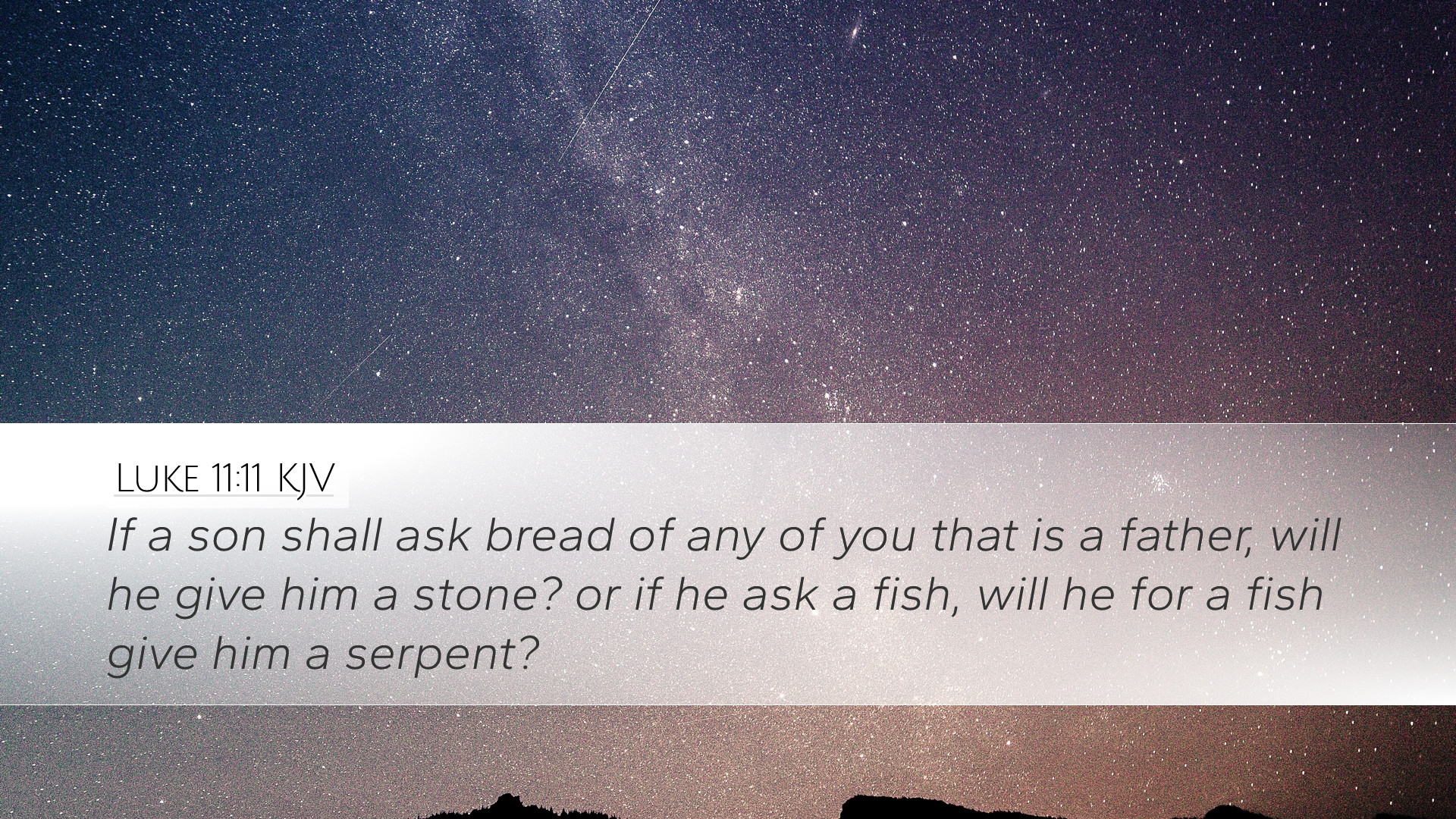Commentary on Luke 11:11
Luke 11:11 states: "What father among you, if his son asks for a fish, will instead of a fish give him a serpent?" This passage is rich with implications regarding God’s nature as a good Father and the relationship between humanity and the divine. It prompts deep theological reflection on the character of God and the nature of prayer.
Contextual Overview
In the broader context of Luke 11, this verse follows Jesus’ teaching on prayer, specifically the Lord's Prayer. It underscores the importance of understanding who God is when we approach Him in prayer. The rhetorical question posed by Jesus serves to illustrate the absurdity of thinking that God would not respond to prayer with goodness and provision.
The Nature of God as a Father
The analogy used by Jesus highlights several key attributes of God the Father:
- Goodness: Just as earthly fathers desire to provide for their children, God’s inherent goodness ensures that He wishes for the best for His children.
- Generosity: A good father delights in giving good gifts to his children. This points to the abundant grace and mercy God extends to those who ask Him.
- Wisdom: Unlike earthly fathers who may sometimes err in judgment, God possesses infinite wisdom and knows what is truly good for His children.
Theological Implications
The question raised in this verse reflects a profound theological truth about the trustworthiness of God:
- The Assurance of Expectant Prayer: Believers are encouraged to approach God with confidence, knowing that He will not lead them astray or give them harmful gifts.
- Contrast with Human Experience: The comparison with a serpent—a potentially deadly animal—serves to reinforce the idea that God’s intentions are always benevolent and caring.
Commentary Insights
Matthew Henry
Matthew Henry emphasizes that this verse illustrates God's willingness to answer prayers. He notes that earthly parents, even those who are not perfect, inherently seek to provide good for their children; therefore, how much more will God, who is perfect, respond favorably to requests made by His children. Henry also points out the importance of recognizing the type of requests we make and the nature of our trust in God's provision.
Albert Barnes
Albert Barnes elaborates on the nature of God's gifts, highlighting that believers should expect gifts that nurture their spiritual growth rather than mere earthly desires. He underscores the importance of understanding God's sovereignty and kindness in the context of prayer. Barnes discusses the role of faith, arguing that faith must accompany our requests, fostering a deeper relationship between the believer and the Father.
Adam Clarke
Adam Clarke draws attention to the cultural and linguistic contexts of the passage. He explains that the fish and serpent metaphor resonates with the audience's understanding of earthly needs versus spiritual necessities. Clarke elaborates on the idea that all gifts from God may not be immediately recognized as 'good' from a human perspective but are ultimately for our benefit in His divine plan. This understanding emphasizes reliance on God's wisdom over human interpretation of what is beneficial.
Applications for Pastors and Theologians
This verse serves as a powerful reminder for pastors and theologians to communicate the nature of God vividly in their ministries. They are encouraged to:
- Teach on God’s Character: Educate congregants on the nature of God as a loving and generous Father, helping them to trust in His provision during times of need.
- Encourage Expectation in Prayer: Help believers cultivate a life of prayer that is expectant, knowing that God hears and responds in ways that promote spiritual well-being.
- Understand the Context of Desires: Provide pastoral care by guiding individuals to align their requests with God’s will, focusing on spiritual growth rather than mere earthly desires.
Conclusion
Luke 11:11 encapsulates a profound truth about the relationship between God and His children. It invites believers to approach prayer with confidence, knowing that their heavenly Father will always respond with goodness, wisdom, and love. Understanding this truth enables a deeper, more meaningful relationship with God and fosters a community of faith characterized by trust and reliance on His gracious gifts.


